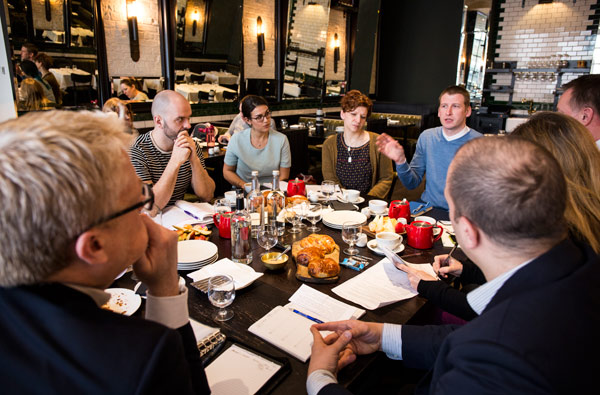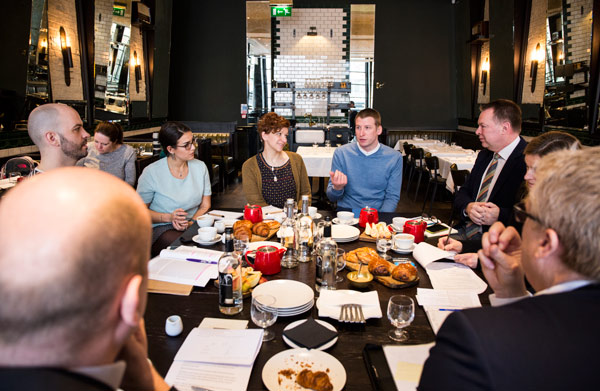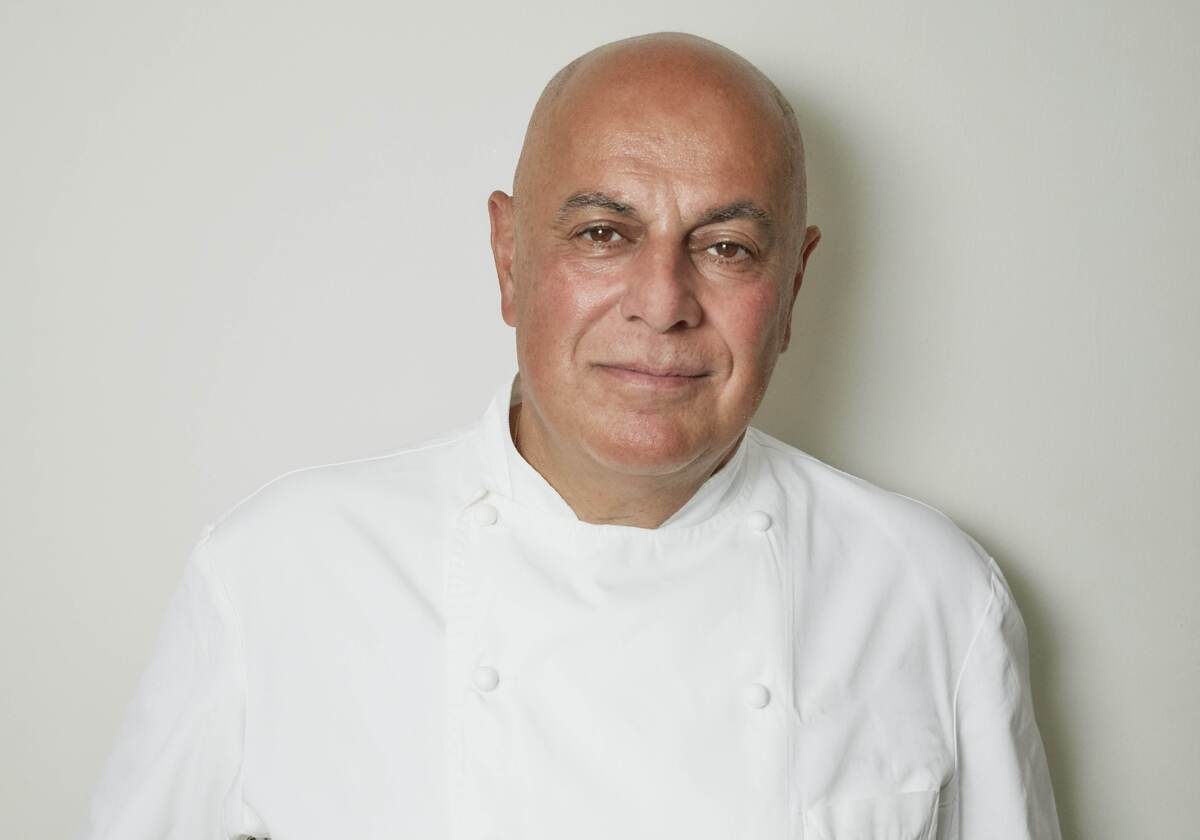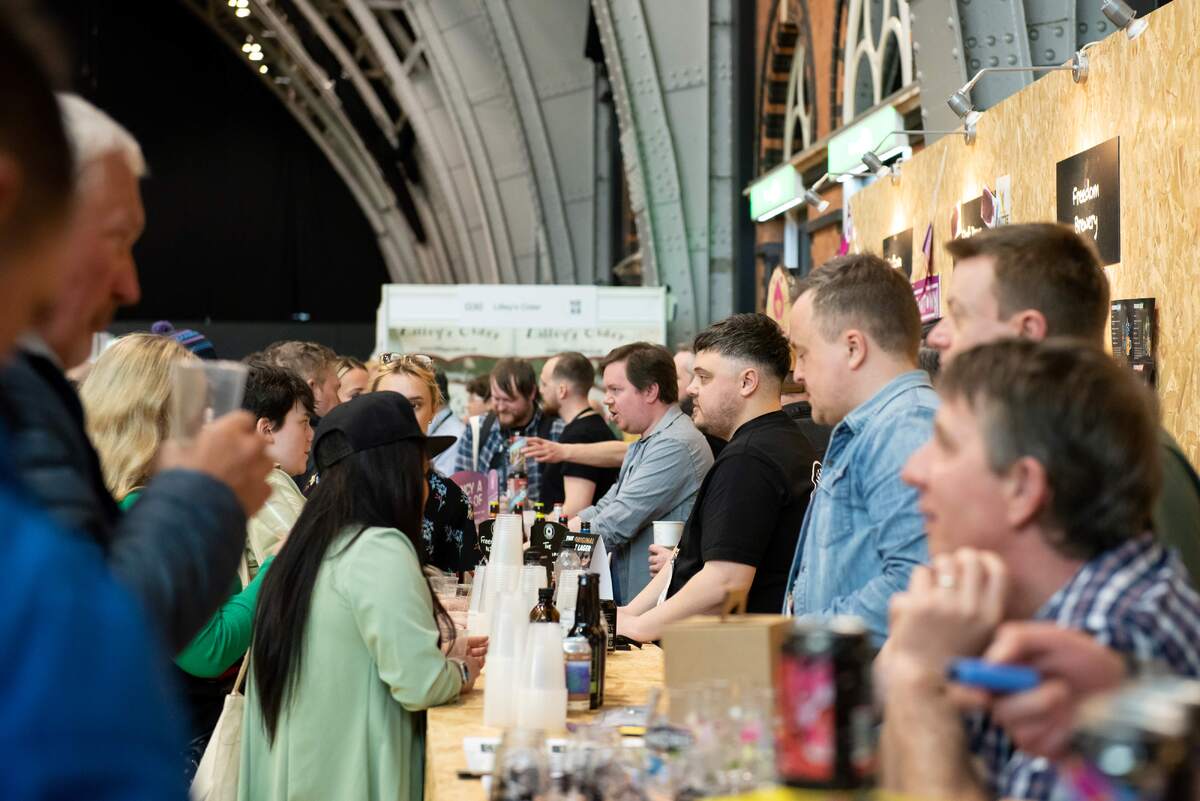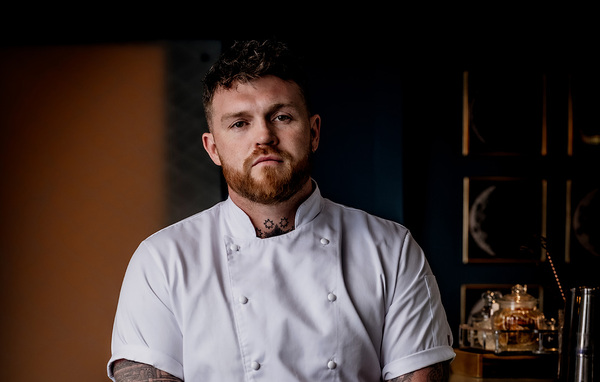Veg out: what's the future for meat on menus?
With the world population set to reach more than nine billion by 2040, our meat-oriented diet is looking unsustainable. But what is the answer? To try and find a solution, The Caterer, in partnership with Quorn, invited food experts to Tredwells, London, to explore how the industry can influence consumers to choose plant-based protein. Rosalind Mullen reports
The panel
From left: James Stagg Deputy editor, The Caterer (chair), Russell Bateman, head chef, Colette's at the Grove, Peter Cross, senior lecturer in culinary arts and food studies, University of West London, and Tony Davison, global head of foodservice, Quorn Foods
From left: Sarah Halevy, food systems adviser, WWF UK, Mike Hanson, head of sustainable business, BaxterStorey, Justin Horne, founder, Tiny Leaf, Tess Kelly, sustainability projects officer, Quorn Foods, and Chantelle Nicholson, chef-patron, Tredwells
Besides animal welfare, what are some of the reasons why meat-eaters should consider a plant-based diet?
Tess Kelly (TK):
Justin Horne (JH): It takes 3,000 litres of water to produce 1kg of meat. Meat uses more resources than a plant and there is a lot of waste.
Tony Davison (TD): We got funding for research at Exeter University and dispelled the myth that high-performance athletes need meat. They donât. You need the right amount of the right proteins, and we found that vegetable proteins can do the same work.
Are you seeing a shift in public preferences towards more vegan and vegetarian dishes?
JH: It is on the increase. In the past six months there has been a 136% increase in people switching to a plant-based diet. Itâs driven by the realisation that with climate change our consumption of animal proteins canât be sustained.
Chantelle Nicholson (CN): Some people also donât agree with the treatment of animals.
TK: It is a top concern for millennials. They are worried about climate change.
Sarah Halevy (SH): There has been an increase, but in the UK there are still a huge number of people eating meat. People are seeing the health benefits of a plant-based diet, but we need to make sure it is not a food fad. We need to create long-term change.
How can you ensure long-term change is achieved?
Mike Hanson (MH): We need to make sure plant-based alternatives to meat are amazing.
SH: We also need policy back-up â" a clear steer from government that enables businesses to feel confident in making changes. We need scientific research to present to the consumer and get people behind it to ensure a solid framework for change.
JH: A lot more people would eat a lot less meat if they had to catch the animals themselves.
TK: At events, for instance, guests should not have to âopt inâ to a vegan or vegetarian option. We need a revolution in the nutrition community. I went to an international nutrition conference and was given processed meat wrapped in plastic for lunch.
There is a groundswell in London, but is it the same everywhere?
TD: Meat consumption around the rest of the world is still increasing, so we canât get caught up in the euphoria in London and the UK. In fact, globally, more people are moving towards a meat diet.
JH: There has been a 725% increase in meat consumption in South East Asia as they follow the trends of luxury, while Westerners are moving to plant-based diets.
Is the education system keeping pace?
TD: In schools, discussions about meat-free options have come a long way. To see meat-free Mondays and vegetarian food integral to school meals makes me feel passionate about a future where there wonât be separate vegetarian menus.
Peter Cross (PC): The curriculum in the universities is evolving, too. There is a vegetarian module as part of the syllabus â" though how do you cram everything into that?
SH: My children have grown up with vegetarian options at nursery, but it needs to come from the parents, too. There needs to be more than one influence.
How can meat-free dishes be better presented on menus?
Russell Bateman (RB): If you label dishes as vegetarian and vegan, it tells the customer that it is only for those people. Weâve offered a ânature menuâ alongside our other menus for five years and have just changed it to vegan and gluten-free. We had a tasting and the managers were blown away because they didnât realise it could taste so delicious.
CN: The term âplant-basedâ feels more inclusive.
TD: Restaurateurs have a business to run, but itâs interesting that now you are less likely to see a vegetarian dish at the bottom of the menu priced £7.95. It is now £25 and delicious. It challenges chefs and gives them new inspiration.
MH: In a survey, the uptake of plant protein went down 68% when it was listed in the vegetarian section of a menu because there is a perception that it is for âthemâ, not for all. There are two schools of thought: that you need to flag up your vegan meals because you want people to know they are there; or that you shouldnât advertise them in order to normalise it. You need a balance.
SH: In 10 yearsâ time, I would like to see it flipped so the meat option is in a panel â" or where we just talk about protein rather than meat versus plants. Is there a place for more meat-free dishes on fine-dining menus?
CN: I feel it is an inclusive thing to do and I am increasingly interested in meat-free cooking. I held plant-based supper clubs in November on Monday nights and they were sold out for 60 people. I was initially worried that vegetarians would be upset about the leather chairs and other guests eating meat around them, but they want to eat out in a normal restaurant with friends and they want to eat well.
What are the challenges in cooking and selling vegetarian dishes that taste good?
CN: I have overheads in running the restaurant and for me it takes longer to cook a vegetarian dish. Steak is easy, for instance. I can buy a really good piece of meat, grill it, serve it and charge £35. A cauliflower dish is more time-consuming: you need to caramelise it, use herbs and so on, but I canât charge £35 for that. You need to approach a vegetarian dish as you would a meat dish, with all the components â" texture, flavour and the same effort. I have written a book [Planted] on plant-based food as a resource for chefs.
RB: Yes. The same things that make meat delicious make vegetarian food delicious. Chefs need to use herbs, nuts, oils, caramelisation, cocoa butter, acids. These ingredients make all food delicious and moreish, not just meat. The more you challenge younger chefs, the more they become excited about it.
Is pricing a challenge if people donât recognise what expertise you are putting into a vegetarian dish?
RB: I havenât found that. We had a vegan promotion in January and booked 46 seats. It meant we could lower the price to cover drinks, so instead of the usual £125 a head with no drinks, we could offer £75 with drinks included. JH: We had a pop-up in January that turned tables three times and didnât just attract veggies. A lot of meat-eaters came in and it changed their perception of what vegetarian food can be.
CN: If our restaurant was [fully] plant-based, we couldnât pay the rent. The GP is bigger on veg, but we need the spend-per-head and the overall revenue coming in.
What is the perception of ingredients such as Quorn?
TD: Chefs will eat it at home, but the difficulty is to get them to put it on the menu. If we can give people access to a highly nutritious plant-based protein, we are doing something right. I say âdonât think of it as a retail brand, think of it as an ingredientâ. Quorn has fibrosity and people enjoy that chicken-like texture.
CN: I couldnât put it on the menu and none of my suppliers supply it.
RB: Iâve put it on the menu and the response was incredible: young people were excited to see it. I made kohlrabi tagliatelle with smoked Quorn chopped into a vegetable bolognese.
MH: It is easily portionable and you can make a bolognese sauce with Quorn mince straight out of the freezer in 10 minutes.
Plant-based burgers have been launched in the US that mimic meat. Is that important?
TD: There are fantastic products in the US. Beyond Meat is bringing its Beyond Burger to the UK this year [it has strategically decided that the UK is an important market] and this is helping to raise awareness. Impossible Foods has invested $180m to launch the plant-based Impossible Burger in the US, too.
CN: Initially, I wondered why they would make it taste like meat, but the impact outweighs what it is.
TD: We have done research, and consumers want the same burger experience as meat-eaters â" a burger with cheese, tomato and a sesame bun. We have teeth, so we are conditioned to bite, but [most] menu developers are trying to create something else. Beyond Burger is great because it brings more awareness. We need more excitement around the meat-free category.
What other sorts of protein diversity are out there?
TK: We will see insects on menus in 10 years, but at the moment they are more palatable if they are on a pizza. People need a stepping-stone.
SH: Insects come with a warning as they are useful for the soil. We canât replace one type of animal protein with another.
Can flexitarianism play an important part by reducing meat uptake?
RB: Thereâs no reason why you canât make a bolognese flavoured with just a bit of meat. You can try 25% beef mince and 75% Quorn.
TD: Vegans and vegetarian numbers are static in the UK, but the birth of âflexitariansâ has seen people dip in and out of non-meat diets and that is where foodservice can play a part. If we can provide better plant-based food it will stick with people who are interested in a less impactful diet. The older generations ate more vegetables because meat wasnât so available 60-70 years ago. Subsidies have made meat readily available to people who previously couldnât afford it. We need to look to the older generation to learn how to make meat go further â" to eat less and better quality. We can look to the millennials and the older generations for a sustainable diet.
What about food waste?
TK: We need to address protein portion size. People are wasting food, so we need to stop eating as much and wasting as much.
SH: Portion sizes are a huge problem. On average, people eat twice as much protein (all types) in the UK compared with the recommended amount [the dietary reference intake is 0.8 grams of protein per kilogram of body weight] so there is a huge issue around it. Protein is everywhere â" they even put additional protein in Mars bars. There is an over-consumption of all types of protein, not just meat, and we are guiding people to alternatives without solving consumption.
What advice do you have for caterers who are nervous about increasing their meat-free offers?
TD: We work with contract caterers who want to do meat-free Mondays, but are worried about the kick-back from meat-eaters. There may be a push-back to start with, but then it becomes part of their offer. We have seen that if you dip your toe in, it will stick.
What does the future look like?
CN: Compared with five years ago, we are in a good place now. The trend will accelerate and gain momentum.
TK: Provenance will become more important and there will be more transparency. You may be able to scan ingredients with a mobile phone to find out if they are ethically sourced and so on. For the trend to really accelerate, social media needs to be harnessed.
RB: You canât eradicate meat from menus, but it needs to be more ethically sourced.
MH: Plant-based dishes need to be amazing, so chefs need training at college.
PC: Some chefs are vegetarian and the students who are coming through are savvy about the environment and recycling. At school, the food technology GCSE course covers food waste, sustainability and other issues. It is there.
What would you like to see happen to maintain the momentum?
TD: We need more direction from government. Consumers need to understand why they need to eat less meat. [With the clean growth strategy], the Tories are trying to engage with a younger audience and know that meat-free appeals to them.
From our sponsor
At Quorn Foods, we look at things differently. We donât start where others do when it comes to producing protein. To reduce our carbon footprint and land and water use, we ferment a natural nutritious protein source, which has a lower environmental impact than animal proteins. The result is that we can inspire people with delicious and irresistible recipes, packed full of flavour and bursting with new taste experiences from around the world, while producing food thatâs both better for us and better for the planet. Itâs all part of our vision for sustainable nutrition.
As more consumers switch to a reduced-meat diet, we are proud to be able to help chefs and caterers serve delicious meat-free meals that their customers enjoy. As well as land and water savings, Quorn products can make massive savings in fat, calories and GHG emissions.





